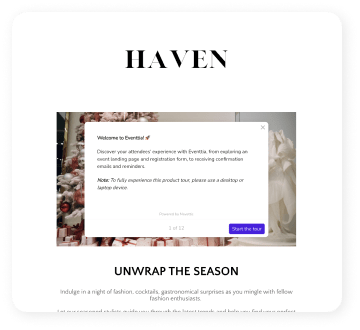Online events are great for increasing brand awareness and generating high-quality leads. But can they make you money? Absolutely. In the same way that you can capitalize on your face-to-face events and charge an attendance fee, you can easily capitalize on your online events. Furthermore, these online events can become a recurrent income resource.
More about that a bit later; first, let’s discuss why you should monetize the content of your online events. First, think about the added value you’re providing. Inviting all those industry leaders and building an insightful conversation about the challenges your attendees may experience is definitely worth something.
The simple access and exposure to valuable content require an investment from your online attendees. Not sure how this works? Think about all the online classes and courses we pay for to improve a skill or learn something new. Although packed as virtual content, the information we get from a content product can maximize our revenue, make us better, or help us achieve a specific goal.
The same thing is true for your online events. If you design a high-quality event packed with insights and data your attendees won’t be able to find anywhere else, have no doubts or second thoughts about monetizing it.
How can you do that? There are multiple ways.
Option 1. Charge for attendance
This is an obvious one, but still worth mentioning. Just like with your face-to-face events, you can charge a specific fee for online attendance. But this fee can’t be as high as in-person events, since that revenue helps pay for the venue you’ve rented, the catering service, the AV installations, etc. Planning and running virtual events are much cheaper, thus the fees should be lower.
The fee should be aligned with the value your attendees will get, meaning the quality of your speakers, your content, the uniqueness of the insights, etc. Apart from that, if you’re running a multi-day online event, you can come up with different pricing models. For example, you can price the attendance to specific sessions, or a fee to just attend the event for one day, etc.
Option 2. Monetize the networking sessions
Networking at virtual events is challenging. Not many people can offer online networking sessions to their clients. However, some brands are partnering up with event management platforms that are providing online networking solutions. You might be wondering how this works. After all, during face-to-face events, people can just mingle and strike up conversations with strangers.
Well, during online events, if you’re using the right technology, your virtual attendees will be able to schedule one-on-one meetings with other people. If you’re going to offer networking at your event, then you should definitely monetize it. These meetings can result in business opportunities for your partners and attendees, so it’s an added value people should pay for.
Option 3. Require payment for access to speakers
Depending on your event’s format, you can design additional virtual rooms in which your online attendees can engage with your speakers by asking them more detailed questions. This is something you’ll want to charge a fee for, too, since your online guests will be getting an opportunity to talk to the speaker one on one and discuss their specific issues or challenges.
You’ll not only need to get your speakers to agree to this, but also probably offer them an incentive in exchange for their time, such as offering them a percent of the revenue from these meetings.
Option 4. Have attendees pay for the workshops
When running a virtual event, you can try the “freemium” model, meaning you’ll be providing both free and fee-based access to your event. One option is to have free access to some keynote speeches but require a fee for access to the workshops.
Why the workshops, you may ask? Because workshops usually teach attendees how to achieve a specific goal or acquire a new skill. In other words, you’re providing extra value. Most attendees will feel that’s definitely worth paying for.
Option 5. Monetize additional VIP dynamics
Apart from the workshops, you can also require payment for some VIP sessions, such as access to a special keynote speech or a round table. These dynamics shouldn’t be extraordinary in terms of format but should excel in terms of content quality and valuable information. You can also monetize another type of online experience, such as maybe a live piano concert that you’ve incorporated in the event program. The choice is yours.
Option 6. Charge for the post-event content
One nice thing about online events is that you can continue profiting off of them even after they’re over. Think about all the content you’ve recorded. You can use all these videos as free lead magnets to increase the number of high-quality leads entering your sales pipeline.
Or you can provide a free pass the first 24 hours, and then charge a fee for the post-event content. Again, the key secret is to be sure that your content is truly valuable. After all, you don’t want to deceive people.
Final takeaway
One of the risks of running a virtual event is having a lot of people sign up, yet only a third of them end up attending the event. You see, when you’re offering your event for free, chances are people will register and simply forget about it. But if they’ve paid to attend your event, they’ve already invested (literally), so they’re more likely to remember and attend.
This is a simple psychological fact. We put more value on the things we’ve paid for than on the things we get for free. Considering the time and effort you’re putting into designing, planning, and running an online event, you should consider monetizing as much of it as possible, which will ensure more people will attend.






